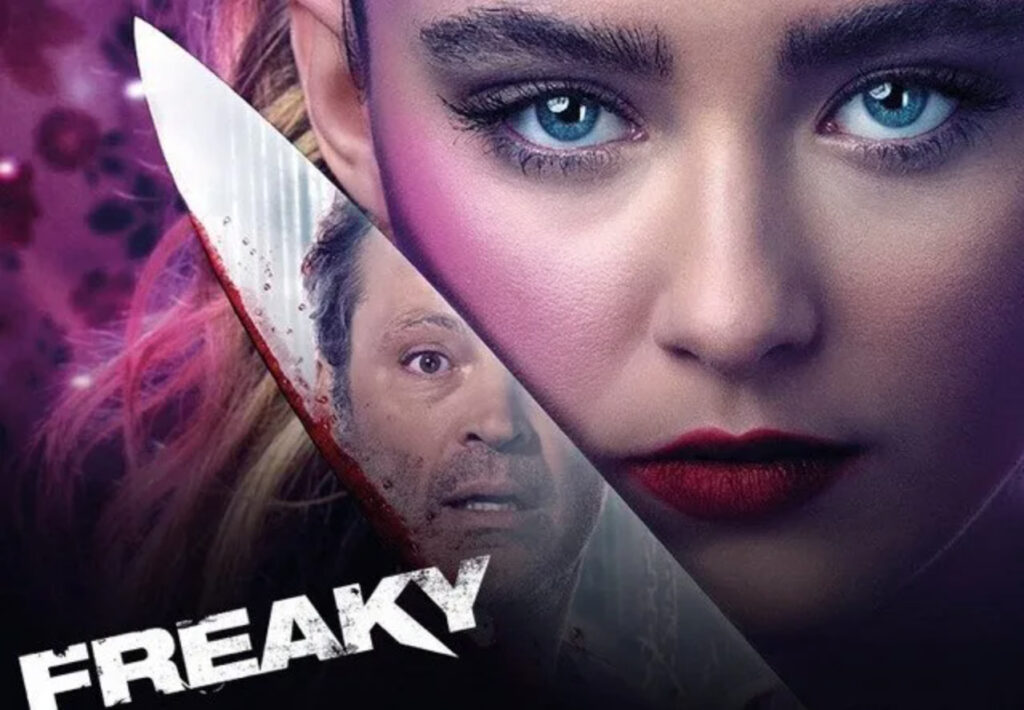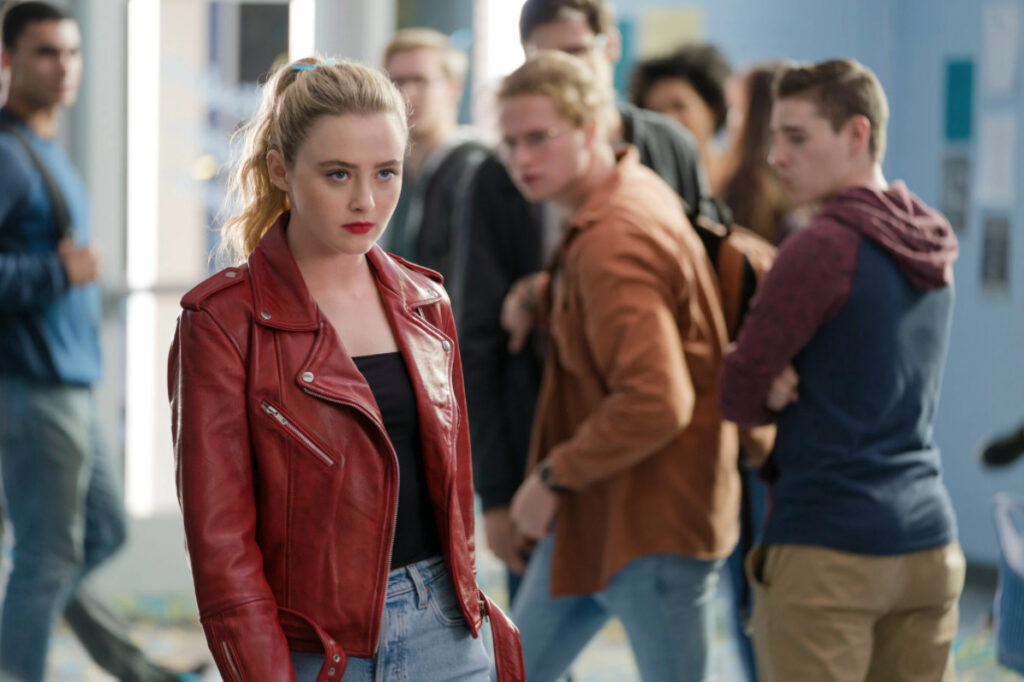Queer Readings: Teen slasher comedy ‘Freaky’
This body-swap horror flick addresses toxic masculinity and gender identity, but does it get it right?
Freaky, the new teen slasher flick starting Vince Vaughn and Kathryn Newton that addresses trans issues, came out last November but is just now hitting DVD and streaming services. With a wider audience now available to the film, I decided to chat with another queer horror writer, Tyler Doupe’ to discuss the implications of the film and its place in the national narrative of trans folk.
Tyler, when I saw that a Mean-Girls-cum-Freaky-Friday a la trans topics was coming out, I was skeptical to say the least. Looking back on the year, though, maybe the Vince Vaughn vehicle, Freaky, was right on time. As a queer person and horror expert, what was your initial thoughts on the film?
Tyler: First off, I’m flattered that you think I’m an expert. Thank you for that. I was really surprised by how ‘woke’ the flick is. It’s a body swap horror comedy for the #MeToo era. And I agree with your sentiment that it came at the perfect time.
Christopher Landon, who co-wrote and directed, made a noticeable effort to not only make an entertaining and funny film; he also used the picture as a vehicle to raise awareness about different gender identities. He reminds us that outward appearance doesn’t dictate a person’s gender identity. And that is a recurring theme throughout the film. The characters are always referred to by their proper pronouns, even when they are in physical forms that don’t match their gender identity.
Where do you see Landon’s hand at work? Where does he do this well?
Tyler: I think that Landon knows how to meld horror and dry humor in a way that has mass appeal. He did it with Happy Death Day and he’s done it again with Freaky. With Freaky, he also manages to pack in a fair amount of social commentary and he does it without being hamfisted or clunky. I loved the ‘woke’ aspects of the 2019 Black Christmas remake but I didn’t think the execution was seamless. Some of the film’s message didn’t feel organic to the storyline but Freaky manages to entertain and enlighten in equal measure and that is no small feat.
Also, you say Freaky is for the #MeToo era; tell us more about this and where you think the film fits in with Elliot Page, Nikki de Jagger, and Eddie Izzard visibility?
Tyler: The flick addresses toxic masculinity and gender identity while packing a really powerful message about gender being related to what’s on the inside instead of your outward appearance. And it does it in a way that I think people can relate to. Using the body swap to illustrate that not only advanced the narrative, it also raised awareness.
Tell me more about where you saw that in the movie? Don’t worry about spoilers.
Tyler: As I mentioned earlier, the characters are always called by their correct pronouns, regardless of which physical form they are in. It’s a somewhat subtle but very meaningful gesture. Also, the actor that plays Josh, the gay best friend is non-binary and identifies as queer, which speaks to another important issue. It’s time to stop casting straight, cis gendered men to play gay and trans characters. There are plenty of talented queer performers and that is the pool we should be pulling from. Like people of color, the lgbtq+ community has long had to sit back and watch people that aren’t part of our community play us in film and television. It’s so refreshing to see Misha Osherovich given a chance to shine in this role.
On a related note: I’ve heard some complaints about Josh being too stereotypical and effeminate.. But, the film was written by two gay men and directed by a gay man. It wasn’t Hollywood trying to bend a character to what some straight screenwriter thinks it is to be gay. Yes, Josh is a little flamboyant. But he isn’t a caricature. And some gay men are flamboyant. So, I hate to see that used as a criticism. I look forward to a time when gay representation is common enough in film and television that we can see all kinds of lgbtq+ characters on screen with all different ranges of mannerisms. But until then, I think we should be championing efforts that support inclusivity.
Unlike a lot of horror films, the supporting characters are meaningful and they are played by actors from diverse backgrounds. Main character Millie’s best friends are a gay man and a black woman. And they are essential to the plot. They serve as more than just set decoration with dialogue or cannon fodder.

What else makes this film compelling and not just another slasher or film pandering to the LGBTQ+ community?
Tyler: In Freaky the body count is comprised mostly of reprehensible characters — especially antigay/trans characters. Obviously, the flick isn’t suggesting that homophobic jocks and bullies deserve to die. But it certainly sends an important message about why toxic masculinity and bullying are harmful.
I think that is a message we all need to hear! And the nonbianary characters on Sabrina and Star Trek: Discovery contribute similar examples. Then out in the real world we have Elliot Page.
Tyler: Yes! Elliot Page coming out is a huge win for our community. When brave people like him share their story, people’s minds are opened and positive change can come about. The more that gender identity is discussed in the media and depicted by the entertainment industry, the more people will come to understand it and hopefully learn to celebrate our differences instead of being afraid of them.
One complaint I have heard from queer comic fans again and again is that trans issues get coded through magical body swaps, curses, or mad science. This is problematic because it reduces trans experience to a plot point and a problem. Where does Freaky fall in your eyes?
Tyler: Freaky isn’t specifically about the trans community and doesn’t have any characters that are explicitly portrayed as trans, per se, so this may be different than representation in other films, television series, and books. But what’s impressive to me is that it breaks from the expectation that body swap comedies should feature someone that presents as male swapping with someone else that presents as male or someone that presents as female swapping with a character that also presents as female. Freaky is one of the only examples I can think of where the characters swap between different genders and it’s done very respectfully. Freaky is a step in the right direction and I hope it speaks to anyone battling negativity surrounding their gender identity. Additionally, I hope that it’s messaging and positive depiction of queer characters helps open a few minds.

ABOUT TYLER DOUPE’
Tyler Doupe’ is the managing editor at WickedHorror.Com. He has also contributed to Dread Central, Fangoria Mag, Rue Morgue Mag, Scream Mag, The Fandango Movie Blog, SyFy Wire, and more. He lives with his husband and their four pets in Portland.






